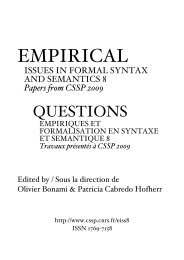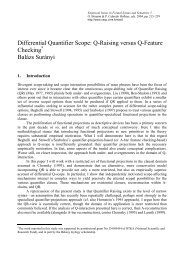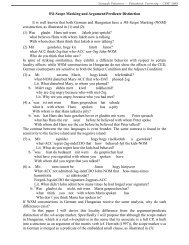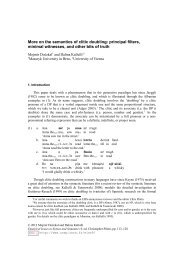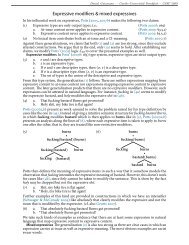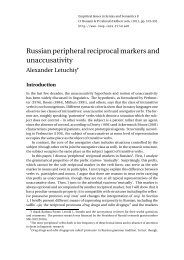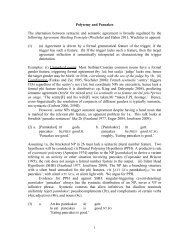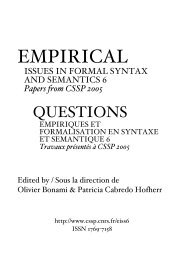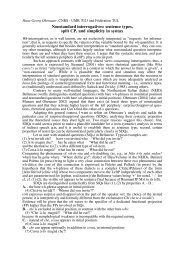Empirical Issues in Syntax and Semantics 9 (EISS 9 ... - CSSP - CNRS
Empirical Issues in Syntax and Semantics 9 (EISS 9 ... - CSSP - CNRS
Empirical Issues in Syntax and Semantics 9 (EISS 9 ... - CSSP - CNRS
Create successful ePaper yourself
Turn your PDF publications into a flip-book with our unique Google optimized e-Paper software.
4.4. Intervention effects<br />
Observe the contrast <strong>in</strong> (31), where we see that a universal quantifier <strong>in</strong>terven<strong>in</strong>g between<br />
the PPI <strong>and</strong> the negation at LF can rescue the otherwise deviant configuration [neg. . . PPI].<br />
(31) a. ∗ John didn’t give Mary someth<strong>in</strong>g. *not>PPI<br />
b. ̌John didn’t give everyone someth<strong>in</strong>g. ̌not>∀>PPI<br />
The only cases of <strong>in</strong>tervention that have been dealt with <strong>in</strong> the framework of alternative-based<br />
semantics for PSIs are those <strong>in</strong>volv<strong>in</strong>g an implicature-<strong>in</strong>duc<strong>in</strong>g element <strong>in</strong>terven<strong>in</strong>g between the<br />
DE operator <strong>and</strong> an NPI. Relevant examples are provided below <strong>in</strong> (32). 7<br />
(32) a. ̌Anna didn’t tell Mary to eat anyth<strong>in</strong>g. ̌not>NPI<br />
b. ∗ Anna didn’t tell everyone to eat anyth<strong>in</strong>g. *not>∀>NPI<br />
The proposal, as advanced by Chierchia (2006) <strong>and</strong> Gajewski (2011), says that <strong>in</strong> the sentences<br />
above, universal quantifiers such as everyone disrupt the DE-ness required by the NPI to survive.<br />
Be<strong>in</strong>g themselves scalar items with the potential of hav<strong>in</strong>g active alternatives, these quantifiers<br />
f<strong>in</strong>d themselves <strong>in</strong> a structural position, the scope of an exhaustify<strong>in</strong>g operator, where they must<br />
obligatorily activate their scalar alternatives. 8 Once these alternatives are taken <strong>in</strong>to account,<br />
the previously DE environment created by the negation is no longer DE due to the implicature<br />
brought about by the <strong>in</strong>terven<strong>in</strong>g quantifier, as shown below with always.<br />
(33) John didn’t always read any novels.<br />
John sometimes read any novels.<br />
In effect, what happens <strong>in</strong> this case is that the alternatives of the NPI end up be<strong>in</strong>g exhaustified<br />
<strong>in</strong> an UE environment, which results <strong>in</strong> semantic deviance.<br />
Return<strong>in</strong>g to the cases <strong>in</strong>volv<strong>in</strong>g PPIs <strong>and</strong> <strong>in</strong>tervention, I will now show how this analysis<br />
carries over. Unlike with NPIs, an <strong>in</strong>terven<strong>in</strong>g universal rescues the otherwise illicit configuration,<br />
allow<strong>in</strong>g the PPI to scope under a local negation. As before, the idea is that the universal<br />
quantifier, be<strong>in</strong>g <strong>in</strong> a DE context, gives rise to an implicature that reverses the entailment <strong>in</strong>ferences,<br />
from DE to UE, shown below <strong>in</strong> (34).<br />
(34) John didn’t always call someone.<br />
John sometimes called someone.<br />
We see that once the SIs of the quantifier are taken <strong>in</strong>to account, the PPI f<strong>in</strong>ds itself <strong>in</strong> a UE<br />
context, a context that allows for the consistent exhaustification of the PPI’s alternatives.<br />
The fact that PPIs <strong>and</strong> NPIs are both sensitive to the presence of an <strong>in</strong>tervener falls out immediately<br />
s<strong>in</strong>ce, <strong>in</strong> this framework, PSIs belong to the same class of elements as scalar items <strong>and</strong><br />
are thus expected to crucially <strong>in</strong>teract when local to each other. This framework is furthermore<br />
superior <strong>in</strong> that it predicts that only end-of-scale elements (always but not sometimes) should<br />
disrupt/rescue the licens<strong>in</strong>g of the PSI s<strong>in</strong>ce only such items give rise to SIs that can reverse the<br />
monotonicity of the environment. For more details, see Chierchia (2006) <strong>and</strong> Gajewski (2011).<br />
7 Intervention by presuppositional elements such as too is also attested. Possible approaches to the <strong>in</strong>tegration of<br />
presuppositional elements with<strong>in</strong> the doma<strong>in</strong> of <strong>in</strong>terveners are discussed <strong>in</strong> Homer 2011b <strong>and</strong> Chierchia 2011.<br />
8 I assume this obligatory activation of alternatives is due to a syntactic check<strong>in</strong>g condition which states that<br />
whenever an alternative-bear<strong>in</strong>g element (e.g. scalar items) f<strong>in</strong>ds itself <strong>in</strong> the scope of an exhaustify<strong>in</strong>g operator, its<br />
alternatives need to be taken <strong>in</strong>to account <strong>in</strong> the calculation of implicatures.<br />
236



